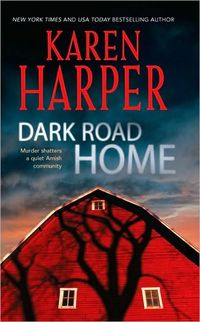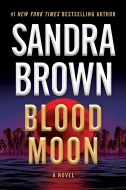 THE LOVE HATERS |
 Fall headfirst into July’s hottest stories—danger, desire, and happily-ever-afters await. |

Purchase
Maplecreek Amish #1 Romance Suspense Excerpt of Dark Road Home by Karen HarperMay 9, 1993 Maplecreek, Ohio Some said you can't go home again, but Daniel Brand was bound to do just that. He pulled the U-Haul behind the house, where no one would spot him from the road. Starlight grayed the black of early night when he turned out the headlights and killed the engine. He sat for one moment, gripping the steering wheel. His stomach knotted at all there was to face and do here. Starting right now. He climbed down, stiff and sore from the long drive, waging war with himself for calm, even for courage. His new house, like his new life, was an old one, but he'd make it right, make everything right from cellar to roof, inside and out. He was taking his life's biggest step forward by taking many steps back. He unlatched the back doors of the truck and yanked them open. From the dark cavern loaded with his meager possessions, piles of wood, and handmade furniture, he dragged out his toolbox and flopped it open on the grass. He strapped on his leather tool belt, jammed wire cutters, screwdriver, metal snips, a claw hammer, and needle-nose pliers in the pockets. Pulling on leather work gloves, he grabbed a saw. He scraped his tall stepladder out, hefted it next to the back porch, and jerked it open. With his flashlight wedged in his belt, he climbed to the porch roof, then to the steeper shingled roof of the house. He hunkered down next to the tall television antenna and began to work. In five minutes he had cut the antenna loose. He shoved it over the side. It crashed two stories down, shuddered, and lay still. Next, he dug at the nails and metal bands securing the two old lightning rods, but did not toss them over. They would fetch a good price as antiques at the Saturday morning auction in Pleasant. He gazed at the plain, clean roofline with relief, for it would publicly declare his commitment to all who rode by. Sweating in the cool breeze, Daniel thrust aloft the rods like trophies of his victory. He had conquered himself; he had come home. Slowly, he lowered the rods to his knees and gazed down from his precarious perch. The dark bulk of the U-Haul waiting to be unloaded was his last link to his previous life. He had snapped the radio off once he crossed the state line from Indiana, right in the middle of that bouncy-beat chorus he loved in "Achy Breaky Heart." He didn't mind giving up country music for good, he tried to convince himself. After he turned the truck in tomorrow, he'd never drive again, either. The only lights he could see were from Verna Sprigg's Sewing Circle Shop and its second-story living quarters across the field. Two large farms, his own family's and his sister Emma's in-laws', lay beyond his lot line, but kerosene lanterns could never be spotted from here. No traffic on the road, nothing but star speckles overhead until he watched the full moon, big as a ripe peach, roll over the hilly horizon. It was a stunning sight, but he had things to do. The knot in his stomach yanked tight again as he scooted crab-like from the roof, to the porch, and descended the ladder. He laid the lightning rods in the grass. Under the clay pot where Emma said it would be, he found the key. He unlocked the creaky back door and went in. The interior smelled of vinegar, lemon, and soap; Emma had written that she and her girls would have it spick-and-span for him. He turned on no lights and never would here—not the electric, anyway. Tomorrow he would disconnect it and have the wires pulled soon, the ones for the telephone, too, for he hoped to bring a good, Plain woman here, one he could trust and, hopefully, someday love. In the empty living room, the thick soles of his work boots sank into what Emma had described as fairly new wall-to-wall carpet, thick and green as grass, you won't believe it, Dan. He flicked off the f lashlight and stood silent. But even in the dark, he saw pairs of white, fancy, ruff led draperies at each window like graceful ghosts bowing to a partner for a dance. He yanked them all down and hurled them in a corner. Tears burned Brooke Benton's eyes as she listened to her niece Jennifer's closing to her bedtime prayer to "please tell my mommy I still love her. Especially because it's Mother's Day. And good night, God. Amen." Brooke bent down to kiss the child's forehead. "You know," Brooke said, "God has a very good memory, so maybe you don't need to remind Him of that every night, because then both of us just start crying." "Yes, but she used to forget things sometimes. When she was sick, I had to tell her some stuff again and again. So I'm asking Him to remind her," Jennifer insisted in her seven-year-old's logic that often amazed Brooke. "Come on now. It's hit the hay time, as Mrs. Spriggs says," Brooke urged, plumping up her pillow and trying to make her voice light. "That Monday-morning school bus will be here bright and early, Jen." "I guess Daddy would be mad at me for going to bed late, don't you think?" Brooke sank back on the edge of the four-poster bed and gently stroked Jennifer's hair. "No, I'm sure he'd understand that we were just having fun. I told you he's not mad at you for anything." Frowning, the petite, blue-eyed blonde looked away to arrange her two dolls, leaned against the other pillow. They were totally mismatched: the small, molded plastic, adolescent Skipper doll had been Jennifer's mother Melanie's years ago; the soft, faceless Amish baby doll, named Nettie, was a recent gift from her friend Susie. "I know," Jennifer said, her voice shaky with exhaustion and emotion, "that Daddy's not mad at me because Mommy died. That wasn't anyone's fault but cancer." "That's right" was all Brooke could manage, but even then her voice broke. She still stroked Jennifer's hair; the child sighed and turned onto her side to cuddle into her deep down pillow. After tucking the sheet and quilt around Jennifer's thin shoulders, Brooke rubbed her niece's back, went out, and snapped off the light. A floorboard creaked loudly, but it would take a bomb to wake Jennifer once she fell asleep in this pretty haven of her room. The bed, pillow, quilt, the rag rugs on the floor—Brooke thought again how this old but vibrant house and store below were just like their owner, Verna Spriggs. Brooke missed her, but it had been her suggestion that Verna seize the chance for a long visit to her son's family in Maine. And immersing herself in Verna's duties made her feel useful as well as safe and sane again. Brooke went downstairs to the big quilting room where she and Jennifer had been practicing line dancing with a videotape called Country Dance Time. Learning the Elvira and the Tush Push to the lilting, rhythmic tunes was one of many shared activities that bound them closer. Tonight Jennifer had gotten so into it, she seemed to temporarily forget her troubles, too. Brooke pulled the quilted cover off the TV again—for when it was not in use, they kept it draped in deference to the Amish who came here—and rewound the tape to lesson one, the grapevine step. With the sound turned low, in her jeans, T-shirt, and beat-up boots, she did the grapevine around the room—step, behind, step, kick—while she straightened the quilts for sale on their circular revolving racks, retacked price cards for pieced wall hangings and table runners on the peg-board display, and aligned booklets and supply boxes on shelves. Monday morning would come too soon for her, too. The two group quilts in progress—a Courthouse Steps and a Drunkard's Path—stretched on their separate rectangular frames needed no tending, for the Amish women who stitched them always left things immaculately ordered. Her only real Amish friend so far, Emma Kurtz, who oversaw things, made certain of that. But Brooke noticed some scraps under one quilt where Emma's youngest, Susie, and Jennifer had been playing house on Saturday. She crawled under to pick those up. The vacuum didn't reach clear under here, anyway. She jumped when she heard a knock—and on the back door at this hour. Her heart thudding, she scrambled out from under the quilt, then calmed herself as she snapped on the kitchen light and walked to the back door. This was not the city, she scolded herself, and he—or them—couldn't possibly find her here. It was probably just an Amish person wanting to use the phone. She peered out through the window and smiled in relief. Emma's eldest child, Katie, age eighteen, who came with her to quilt if she was not tending the house or her siblings, stood there with three others. Holding Katie's hand until the door opened was Gideon Stoltz, Maplecreek's blacksmith's son, whom Brooke knew Katie had been dating. Behind them stood two other young people about Katie's age whom Brooke did not know. "Your lights, we saw them still on," Katie said. "Stop by with Gid anytime for an ice-cream bar, you said—that Ha—Hagens…" "Häagen-Dazs. Yes, please, all of you, come in." "This is Cora Troyer, my best run-around friend, and this is her come-calling friend, Ezra Yoder," Katie told her, blushing ever so slightly under the freckles speckling her cheeks and pert nose. The girls removed their black shawls and bonnets, leaving their white starched kapps covering the back of their heads. All Amish women wore their uncut tresses parted in the center and swept straight back in a hidden knot. Katie's green eyes looked huge behind her wire-framed glasses, especially because her dress was emerald green. How much she looked like Emma, even the glasses, Brooke thought, warmed by the fact these four had come to visit. It showed her acceptance in the community was growing, even without Verna, whom the Maplecreek Amish had known and trusted for years. The boys did not remove their straw hats, nor do more than nod. No pleased to meet you's, and Brooke knew to expect no thank you's or even a good-bye. For such polite pleasantries were deemed "fancy" Excerpt from Dark Road Home by Karen Harper |
|
| |||
|
||||



 © 2003-2025
© 2003-2025